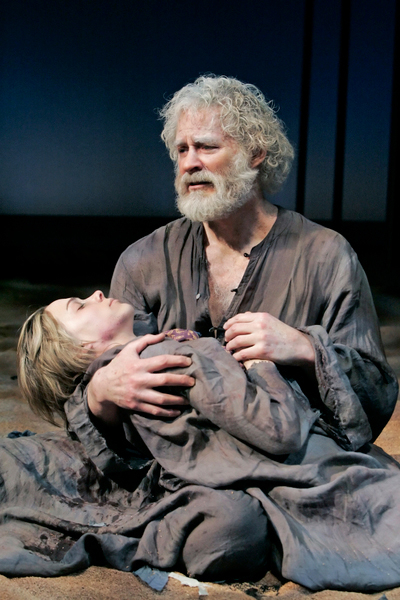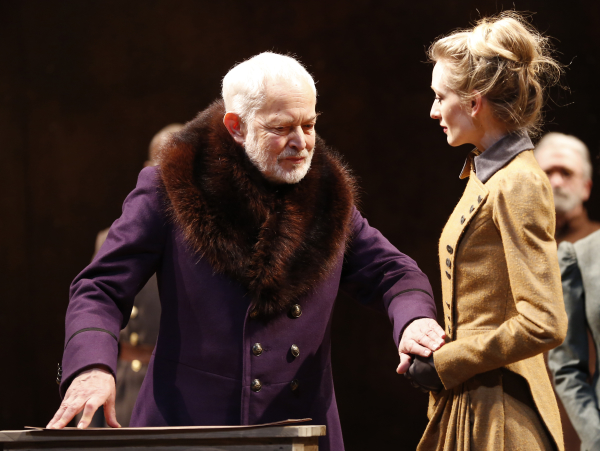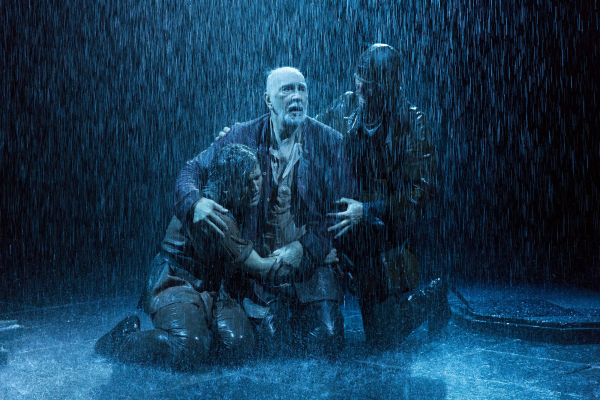Lear, There, and Everywhere (Part II)
This is part II of Michael Feingold's latest "Thinking About Theater" column.
Click here to read part I.

(© The Public Theater)
Something is "wrong" about King Lear, in a way unlike any other Shakespearean tragedy. Most of Shakespeare's tragic heroes — Macbeth, Othello, Brutus — start out as good men who give way to a temptation that reveals their inner flaws. Even Hamlet, an equivocal figure, begins as the product of an equivocal situation. But Lear begins with a situation that hardly makes sense, and Lear himself is its cause.
Having gotten old, he will divide his kingdom in thirds among his daughters. Only, the thirds aren't equal (Cordelia's is "more opulent"), while the division weirdly seems to be both prearranged and dependent on the words of the moment. Lear's two elder daughters speak nicely formal, courtly speeches. Once their thirds are marked on the map, Cordelia's share has been predetermined (and Burgundy's lines after Lear's blowup imply that her suitors already know its extent). All Cordelia has to do is speak her piece politely, choose her spouse, and collect her kingdom.
So why doesn't she? Since she, unlike her sisters, genuinely loves Lear, why does she have to "Love, and be silent"? Apparently, she shares her father's obstinate impulsiveness. One reason we rank Lear as a great play is because it confuses our sympathies: While the villains — Cordelia's sisters, Cornwall, and Edmund — are clearly vicious and hypocritical, the "good" people tend to be ineffectual (the "milk-livered" Albany) or heedless (Gloucester, Edgar before his crisis). Lear himself, whatever compassion we may feel watching him brought low, is not a likable guy: Arrogant, ill-tempered, too busy demanding love and loyalty to notice who's giving it, he brings about his own undoing."He hath ever but slenderly known himself," his daughter Regan acutely remarks.
The climactic war, like the opening ceremony, offers multiple contradictions. The King of France never shows up to lead his troops. (My theory is that the actor playing him doubled as Edgar, who is needed for most of Acts IV and V.) Nor does the English side have any real leader: Cornwall's dead, Albany's disenchanted; only Edmund, over whom Regan and Goneril are busy squabbling, is committed to the fight. The good guys lose what hardly seems a battle at all, kept wholly offstage.
The last scene, too, contains moments that deeply perplex me. I can fathom how Cordelia dies, at the hands of the Captain whose role I discussed in Part I of this essay. Likewise how Lear, who has endured so much, might die of grief at realizing her loss. But odd circumstances surround his final moments. Why does Kent insist on interrupting him, then of all times, to identify himself? Why, too, when Kent and Edgar move sympathetically toward Lear, does he call them "murderers, traitors all," who've kept him from saving Cordelia?

(© Carol Rosegg)
Can it be that she isn't quite dead yet? The stage direction of the play's first published edition only says "Enter Lear, with Cordelia in his arms"; later editors added the adjective "dead." People did sometimes survive execution by hanging. And Elizabethan stage convention allowed Desdemona, for instance, to speak after having been suffocated to death. Could Shakespeare have intended his audience to expect Cordelia's recovery, only to have their hopes dashed by the blundering intrusion of Kent and Edgar?
That interpretation might justify the wild notion I've always had about the play's closing moments. You can call me crazy: I've already been warned, by one eminent Shakespeare scholar, that it is radical and unsupported by text. But I'm not alone in finding the last six lines of Lear unusually troublesome.
Here's what happens: The ever-modest Albany, though next in line of succession, has instead offered the crown jointly to Kent and Edgar. Kent declines, in a couplet (a pair of rhymed lines) that presages his own death:
I have a journey, sir, shortly to go.
My master calls me; I must not say no.
Presumably he intends to slay himself, ancient-Roman style, over Lear's corpse. (An unreliable edition of the play, printed many years after its first publication, actually adds the stage direction "Dyes.")
Then come two puzzling rhymed couplets, which many editors assign to Edgar (even though the play's first published edition gives them to Albany). The assignment makes sense because Edgar, unlike Kent, has not yet responded to Albany's offer. The first couplet —
The weight of this sad time we must obey.
Speak what we would, not what we ought to say.
— hardly fits Albany, who has already said everything he "would."
But Edgar, I believe, has something more shocking to add:
The oldest have borne most. We that are young
Shall never see so much, nor live so long.
"[…] nor live so long": Therein lies the puzzler. Edgar can't know how long he will live; that's God's decision. "Men must endure their going hence even as their coming hither" was his view just a few scenes earlier.
But much has happened since. Lear has included Edgar among the "murderers, traitors all" who interfered when he might have revived Cordelia — Edgar's second interruption of her fate: His challenge to Edmund distracted Albany from his inquiry about the royal prisoners. ("Great thing of us forgot!" Albany remarks later.) Also, he has partly caused his own father's death by revealing his identity — an offstage parallel to the scene he and we witness when Kent's similar revelation, abetted by Edgar, partly causes Lear's death.
Yes, these are Edgar's lines, which in Albany's mouth would be an empty abstraction. He too intends to die — perhaps, like Kent, then and there. So, as I envision the scene, there stands Albany, with two fresh corpses to grieve over, and a crown in his hands that he must reluctantly wear because nobody else worthy of it wants it. Tragedy without closure, pushed beyond redemption into Beckettian bleakness. Was that Shakespeare's intent? If he could read today's headlines — in Gaza, in Iraq and Syria, in the Ukraine — he would probably find his dark view of "man's work" fully confirmed. I doubt, though, that the fact would ease his torment over our ways.

(© Johan Persson)
Michael Feingold's next two-part "Thinking About Theater" column will appear on consecutive Fridays September 19 and September 26.










